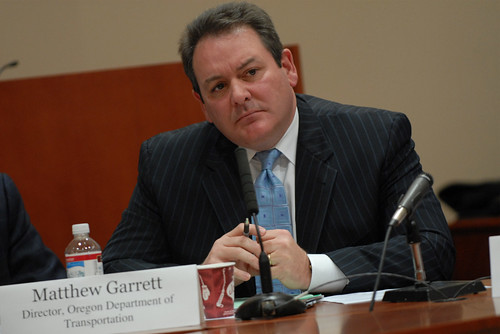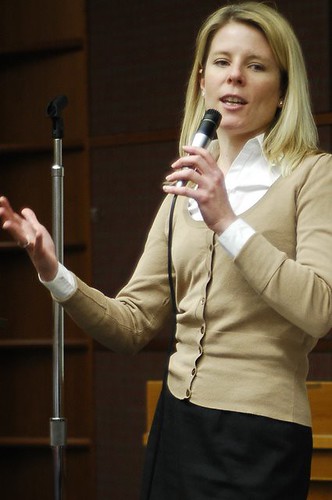A few weeks after left-leaning former Metro president David Bragdon all but called for the firing of Oregon’s top transportation official, legislative Republicans are calling for it explicitly.
Oregon Department of Transportation Director Matt Garrett is facing criticism from both sides over the incident, earlier this year, when his office and Gov. Kate Brown’s temporarily claimed that tens of millions of dollars in freeway investments would be part of reducing long-run carbon emissions in Oregon by more than 2 million metric tons.
“Director Garrett must resign effective immediately so ODOT can begin repairing its broken credibility and we can move forward with new negotiations to finally fix Oregon’s roads and bridges.”
— Senate Minority Leader Ted Ferrioli (R-John Day)
When Garrett later retreated from that claim at a state Senate subcommittee meeting, it effectively killed a proposed bipartisan compromise that would have hiked state gas taxes by two cents and thrown out a forthcoming low-carbon fuel standard that’s expected to drive up Oregon gas prices but reduce greenhouse emissions per gallon burned.
As we wrote at the time, claims that freeway investments are energy savers usually rely on the false assumption that more free-access lanes reduce idling. That may happen temporarily, but they also tend to induce people to drive more and live further from their destinations.
According to emails acquired by Republican state legislators under the state’s open-records act, Garrett told two of Brown’s own top advisors about possible problems with the greenhouse gas reduction claims two weeks before Garrett finally told legislators that they were bad.
One of those gubernatorial advisors, energy policy advisor Margi Hoffmann, has since been replaced. The other, Karmen Fore, remains Brown’s top transportation advisor.
Garrett was appointed to lead ODOT in 2005 by former Gov. Ted Kulongoski.
Advertisement
Here’s the account from Senate Minority Leader Ted Ferrioli (R-John Day):
“In June, following the implosion of transportation negotiations, I demanded Governor Brown immediately request the resignation of Director Garrett due to gross incompetency at best and dishonest manipulation at worst,” said Ferrioli. “Whether Director Garrett knew the numbers ODOT provided the workgroup were wrong or he simply failed to provide the updated numbers in his possession, his decision to surprise workgroup members with new numbers in a public hearing without any advance warning led to the demise of a critical, bipartisan transportation infrastructure package for Oregonians that would have resulted in real carbon reduction. Director Garrett must resign effective immediately so ODOT can begin repairing its broken credibility and we can move forward with new negotiations to finally fix Oregon’s roads and bridges.” …
Despite being aware of clear inconsistencies related to the GHG reduction estimates, Director Garrett failed to have ODOT staff vet the numbers until less than 24 hours before he was scheduled to testify before the Senate Sustainable Transportation Committee.
At a City Club address last month, former Metro president Bragdon also cited “incompetence or dishonesty at the highest levels of ODOT” and later criticized Garrett by title.
Bragdon, who now runs a public transit think tank, tangled with Garrett and his subordinates for years over the proposed Columbia River Crossing freeway-rail expansion. So did some Republicans in Oregon’s legislature.
Governor’s office was also involved
At The Oregonian, Ian Kullgren has a good summary of the twisting events that led up to the June 24 hearing:
The new emails show that Garrett had doubts by June 10. He sent an email to Margi Hoffmann, then Brown’s energy policy adviser, and Karmen Fore, Brown’s transportation policy adviser, saying the reduction estimates were 0.87 million metric tons — not the 2.02 million he’d been telling lawmakers — over 10 years.
The number mattered because the transportation deal proposed to repeal Oregon’s newly approved clean-fuels program and replace it with new carbon-reduction measures. House Democrats and environmentalists were already in revolt. If the new measures looked to be significantly less effective, all bets would be off.
Hoffmann replied, however, that the new number would still be enough to meet the goal.
“That gets us there,” wrote Hoffmann, whom Brown, a Democrat, went on to replace in September.
Other emails show department officials scrambling to figure out a correct estimate. Brian Dunn, a planning analyst for the department, notified Garrett that the 2.02 million number was wrong in an email sent at 12:16 p.m. the day of the hearing.
The Transportation Department had kept repeating the 2.02 number in official estimates until the day of the hearing. Then at the hearing itself, Garrett offered an even lower number: 0.43 million metric tons.
Further complicating the ethics of this situation: during most of the two weeks that Garrett was apparently keeping his opinions from legislators, legislators were keeping their opinions from the public. A bipartisan “gang of eight” legislators from both houses, plus legislative leaders and the governor’s office, negotiated a deal behind closed doors. Informed in part by ODOT’s inaccurate projections, they aimed to unveil and pass the compromise bill within days.
But only after the deal went public and the state’s projections were subject to general scrutiny outside the legislature did Garrett concede publicly that the numbers were wrong.
— Michael Andersen, (503) 333-7824 – michael@bikeportland.org



